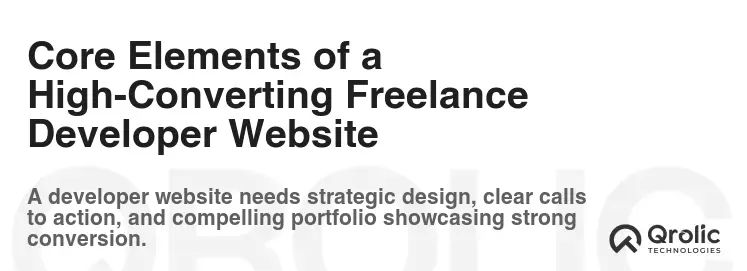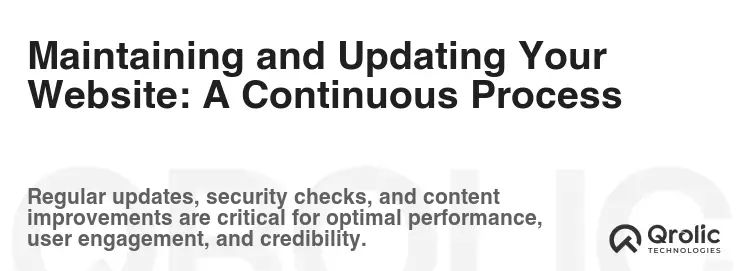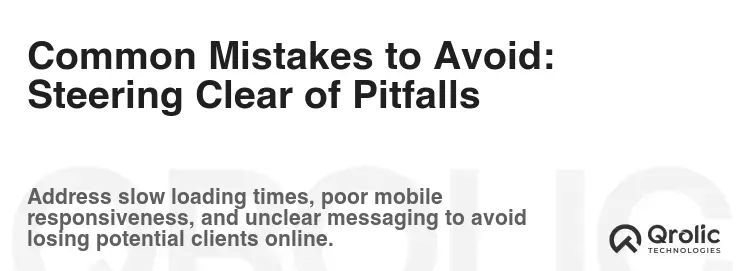Quick Summary:
- Your website is your essential digital storefront.
- Showcase your best work, services, and personality.
- Build trust with testimonials and easy contact.
- Ensure your site is fast, secure, and SEO-friendly.
Table of Contents
- The Indispensable Online HQ: Why Your Website Matters More Than Ever
- Why a Website Beats a Resume (Hands Down)
- Core Elements of a High-Converting Freelance Developer Website
- 1. The Killer “Above the Fold” Section: Hooking Visitors Instantly
- 2. A Portfolio That Screams “Hire Me!”
- 3. Clearly Defined Service Offerings: Showcasing Your Expertise
- 4. A Compelling “About Me” Section: Building a Personal Connection
- 5. Contact Information That’s Easy to Find: Making It Easy to Get in Touch
- 6. Testimonials and Social Proof: Building Trust and Credibility
- 7. A Blog: Establishing Yourself as a Thought Leader
- 8. A Fast and Mobile-Friendly Website: Ensuring a Seamless User Experience
- 9. Search Engine Optimization (SEO): Getting Found Online
- 10. Security: Protecting Your Website and Your Clients
- Beyond the Basics: Elevating Your Freelance Developer Website
- Personalized Content: Tailoring the Experience
- Interactive Elements: Engaging Visitors
- Integrations: Streamlining Your Workflow
- Qrolic Technologies: Partnering for Success
- Maintaining and Updating Your Website: A Continuous Process
- Regular Content Updates: Keeping Things Fresh
- Security Updates: Staying Protected
- Performance Monitoring: Ensuring Optimal Performance
- Common Mistakes to Avoid: Steering Clear of Pitfalls
- Final Thoughts: Your Website – Your Competitive Advantage
The Indispensable Online HQ: Why Your Website Matters More Than Ever

In the digital age, your website isn’t just a nice-to-have; it’s your digital storefront, your 24/7 sales representative, and the cornerstone of your freelance developer brand. Think of it as your personalized billboard screaming, “I solve problems with code!” But a billboard with broken lights or a confusing message won’t attract the right attention. That’s why meticulously crafting your website is crucial. It’s about more than just showing you exist; it’s about convincing potential clients you’re the best solution for their needs. It’s where first impressions are made (or broken), trust is built (or shattered), and deals are sealed (or lost).
Why a Website Beats a Resume (Hands Down)
A resume is static. It’s a snapshot in time. Your website is dynamic. It’s a living, breathing portfolio that showcases your evolving skills, personality, and the impact you’ve had on past projects.
- Control the Narrative: You dictate the story. You highlight the projects you’re most proud of, the skills you want to be hired for, and the testimonials that resonate most with your target audience.
- Demonstrate Expertise: Show, don’t just tell. Code samples, live demos, and detailed case studies prove your abilities in a way a simple bullet point never could.
- Build Trust and Credibility: A professional, well-designed website instantly boosts your credibility. It signals that you’re serious about your business and invested in providing a quality service.
- Generate Leads and Close Deals: Your website is a lead generation machine. Clear calls to action, contact forms, and strategic content marketing can convert visitors into paying clients.
- Expand Your Reach: Unlike a resume, your website can be found by anyone, anywhere, at any time. This opens doors to opportunities you might never have otherwise encountered.
Core Elements of a High-Converting Freelance Developer Website

Now that you understand the “why,” let’s dive into the “what.” These are the essential features that will transform your website from a digital placeholder into a client-attracting magnet.
1. The Killer “Above the Fold” Section: Hooking Visitors Instantly
The “above the fold” section is the first thing visitors see when they land on your homepage – before they scroll. It’s your chance to grab their attention and convince them to stay.
- Compelling Headline: Ditch the generic “Freelance Developer.” Instead, focus on the value you provide. Examples:
- “Building Scalable Web Applications for Ambitious Startups”
- “Transforming Business Challenges into Elegant Code Solutions”
- “Helping Businesses Thrive with Custom Software Development”
- Concise Value Proposition: Clearly state what you do, who you do it for, and the benefits you offer. Keep it short, sweet, and benefit-oriented. For instance: “I help e-commerce businesses increase sales by building custom integrations and automating workflows.”
- Visually Appealing Design: Use high-quality images, videos, or illustrations that are relevant to your services and target audience. Avoid stock photos that look generic and uninspired.
- Clear Call to Action (CTA): Tell visitors what you want them to do next. Examples:
- “Get a Free Consultation”
- “View My Portfolio”
- “Request a Quote”
- Social Proof (Optional): Include a short testimonial or a logo of a recognizable client to build trust.
2. A Portfolio That Screams “Hire Me!”
Your portfolio is the heart and soul of your freelance developer website. It’s where you showcase your best work and demonstrate your skills to potential clients.
- Curate Your Best Projects: Don’t include every project you’ve ever worked on. Focus on the projects that are most relevant to your target audience and demonstrate your desired skills. Highlight your best developer portfolio.
- Detailed Case Studies: Go beyond just showing screenshots. Provide in-depth case studies that explain:
- The Challenge: What problem were you trying to solve?
- The Solution: What approach did you take? What technologies did you use?
- The Results: What was the outcome? Did you increase sales, improve efficiency, or reduce costs? Quantify the results whenever possible.
- High-Quality Visuals: Use professional screenshots, videos, or interactive demos to showcase your work. Make sure your visuals are clear, well-lit, and visually appealing.
- Tech Stack Breakdown: Clearly list the technologies you used on each project. This helps potential clients quickly assess your skillset and determine if you’re a good fit for their needs.
- Client Testimonials: Include testimonials from satisfied clients to build trust and credibility. Ideally, these testimonials should be specific and highlight the value you provided.
- Link to Live Projects (If Possible): If possible, provide links to live websites or applications you’ve worked on. This allows potential clients to see your work in action and experience it firsthand.
3. Clearly Defined Service Offerings: Showcasing Your Expertise
Don’t make potential clients guess what you do. Clearly outline your service offerings and explain the benefits you provide.
- Be Specific: Avoid vague descriptions like “Web Development.” Instead, be specific about the types of services you offer. Examples:
- “Custom E-commerce Development”
- “API Integrations”
- “Mobile App Development (iOS and Android)”
- “wordpress Development and Customization”
- “Database Design and Optimization”
- Highlight Your Tech Stack: Emphasize your core technologies and areas of expertise. This helps potential clients quickly identify if you have the skills they need. For example: “Expertise in Python, Django, React, and PostgreSQL.” Properly highlight your tech stack.
- Explain Your Process: Briefly describe your development process, from initial consultation to project delivery. This helps clients understand what to expect when working with you.
- Focus on Benefits: Don’t just list features. Explain the benefits that clients will receive by hiring you. For example: “We build custom e-commerce solutions that increase sales, improve customer satisfaction, and streamline operations.”
- Package Your Services: Consider offering pre-packaged service bundles to simplify the decision-making process for clients. For example: “Starter Website Package,” “E-commerce Launch Package,” “API Integration Package.”
4. A Compelling “About Me” Section: Building a Personal Connection
People hire people they like and trust. Your “About Me” section is your opportunity to showcase your personality, build a personal connection with potential clients, and demonstrate your passion for what you do.
- Tell Your Story: Share your journey as a freelance developer. What got you started? What are you passionate about? What are your values?
- Highlight Your Expertise and Experience: Briefly summarize your skills, experience, and accomplishments. Focus on the things that are most relevant to your target audience.
- Showcase Your Personality: Don’t be afraid to let your personality shine through. Use a friendly and approachable tone of voice. Share your interests and hobbies (if relevant).
- Use a Professional Photo: Invest in a professional headshot that reflects your personality and brand. Avoid using selfies or low-quality photos.
- Include Social Proof: Add testimonials or endorsements from past clients or colleagues to build credibility.
5. Contact Information That’s Easy to Find: Making It Easy to Get in Touch
Make it as easy as possible for potential clients to contact you. Don’t bury your contact information in the footer of your website.
- Prominent Contact Form: Include a contact form on your homepage and/or a dedicated “Contact” page. Keep the form short and simple, asking only for essential information.
- Email Address: Provide a professional email address (e.g., [email protected]). Avoid using generic email addresses like Gmail or Yahoo.
- Phone Number (Optional): If you’re comfortable providing your phone number, include it on your website.
- Social Media Links: Link to your social media profiles (LinkedIn, GitHub, Twitter, etc.) to allow potential clients to learn more about you and your work.
- Call to Action: Encourage visitors to contact you. For example: “Get a Free Consultation,” “Request a Quote,” “Let’s Discuss Your Project.”
6. Testimonials and Social Proof: Building Trust and Credibility
Social proof is a powerful psychological principle that states that people are more likely to trust and believe in something if they see that other people are doing the same.
- Gather Testimonials: Reach out to past clients and ask them to provide testimonials about your work. Be specific about the kind of feedback you’re looking for.
- Display Testimonials Prominently: Feature testimonials on your homepage, portfolio pages, and service pages.
- Use Real Names and Photos: Include the full name and photo of the person providing the testimonial to increase credibility.
- Request Video Testimonials: Video testimonials are even more powerful than written testimonials.
- Showcase Client Logos: Display the logos of your past clients on your website. This instantly builds credibility and demonstrates that you’ve worked with reputable companies.
- Feature Case Studies: Detailed case studies are a great way to showcase your expertise and demonstrate the value you provide.
7. A Blog: Establishing Yourself as a Thought Leader
A blog is a powerful tool for attracting new clients, establishing yourself as a thought leader, and improving your website’s SEO.
- Share Your Expertise: Write articles that demonstrate your knowledge and expertise in your field.
- Solve Problems for Your Target Audience: Focus on writing articles that address the pain points and challenges of your target audience.
- Provide Value: Offer practical tips, actionable advice, and valuable insights.
- Use Keywords Strategically: Optimize your blog posts for relevant keywords to improve your website’s SEO.
- Promote Your Blog Posts: Share your blog posts on social media, email newsletters, and other online platforms.
- Consistency is Key: Regularly publish new blog posts to keep your audience engaged and coming back for more.
8. A Fast and Mobile-Friendly Website: Ensuring a Seamless User Experience
In today’s mobile-first world, it’s crucial to have a website that’s fast and mobile-friendly.
- Optimize Images: Use compressed images to reduce file size and improve loading speed.
- Leverage Browser Caching: Enable browser caching to store static assets on the user’s computer, reducing the need to download them again on subsequent visits.
- Use a Content Delivery Network (CDN): A CDN distributes your website’s content across multiple servers around the world, ensuring that users can access your website quickly from anywhere.
- Choose a Mobile-Responsive Theme: Use a website theme that’s designed to be responsive, meaning it automatically adjusts to fit different screen sizes.
- Test Your Website on Different Devices: Regularly test your website on different devices and browsers to ensure it looks and functions properly.
9. Search Engine Optimization (SEO): Getting Found Online
SEO is the process of optimizing your website to rank higher in search engine results pages (SERPs).
- Keyword Research: Identify the keywords that your target audience is using to search for freelance developers.
- On-Page Optimization: Optimize your website’s content, meta descriptions, and title tags for relevant keywords.
- Off-Page Optimization: Build backlinks from other reputable websites to increase your website’s authority.
- Technical SEO: Ensure your website is technically sound and easy for search engines to crawl and index.
- Monitor Your Rankings: Track your website’s rankings for relevant keywords to measure the effectiveness of your SEO efforts.
10. Security: Protecting Your Website and Your Clients
Security is paramount. A compromised website can damage your reputation and put your clients at risk.
- Use a Secure Hosting Provider: Choose a reputable hosting provider that offers robust security features.
- Install an SSL Certificate: An SSL certificate encrypts the data transmitted between your website and your users, protecting sensitive information.
- Keep Your Software Up to Date: Regularly update your website’s software, including your CMS, plugins, and themes, to patch security vulnerabilities.
- Use Strong Passwords: Use strong, unique passwords for all of your website accounts.
- Implement a Web Application Firewall (WAF): A WAF helps protect your website from common web attacks, such as SQL injection and cross-site scripting.
Beyond the Basics: Elevating Your Freelance Developer Website

Once you have the core elements in place, consider these advanced features to further enhance your website and stand out from the competition.
Personalized Content: Tailoring the Experience
- Dynamic Content Based on Location: Display different content to visitors based on their geographic location.
- Personalized Recommendations: Suggest relevant blog posts, projects, or services based on the visitor’s browsing history.
- Custom Landing Pages: Create dedicated landing pages for specific marketing campaigns or target audiences.
Interactive Elements: Engaging Visitors
- Interactive Demos: Allow visitors to try out your software or applications before they commit to hiring you.
- Quizzes and Assessments: Offer quizzes or assessments that provide value to visitors and generate leads.
- Calculators and Tools: Create useful calculators or tools that solve specific problems for your target audience.
Integrations: Streamlining Your Workflow
- CRM Integration: Integrate your website with a customer relationship management (CRM) system to manage leads and track customer interactions.
- Project Management Integration: Integrate your website with a project management tool to streamline your workflow and collaborate with clients.
- Payment Gateway Integration: Integrate your website with a payment gateway to accept payments online.
Qrolic Technologies: Partnering for Success

Qrolic Technologies (https://qrolic.com/) understands the unique needs of freelance developers. We provide a range of services to help you build and maintain a successful online presence, from website design and development to SEO and digital marketing. Our team of experts can help you create a website that not only looks great but also attracts clients, generates leads, and drives business growth. We specialize in crafting bespoke solutions that highlight your unique skills and value proposition. Let Qrolic Technologies be your partner in building a powerful online presence that reflects your expertise and elevates your freelance career. From custom development to ongoing support, we’re here to help you thrive in the competitive freelance landscape.
Maintaining and Updating Your Website: A Continuous Process

Your website is not a “set it and forget it” project. It requires ongoing maintenance and updates to stay relevant, secure, and effective.
Regular Content Updates: Keeping Things Fresh
- Add New Projects to Your Portfolio: Regularly update your portfolio with your latest work.
- Publish New Blog Posts: Consistently create and publish new blog posts to keep your audience engaged.
- Update Your Service Offerings: Review and update your service offerings to reflect your evolving skills and expertise.
Security Updates: Staying Protected
- Keep Your Software Up to Date: Regularly update your website’s software to patch security vulnerabilities.
- Monitor Your Website for Security Threats: Use security tools to monitor your website for malware and other security threats.
- Back Up Your Website Regularly: Regularly back up your website to protect against data loss.
Performance Monitoring: Ensuring Optimal Performance
- Monitor Your Website’s Loading Speed: Use tools to monitor your website’s loading speed and identify areas for improvement.
- Track Your Website’s Traffic: Use analytics tools to track your website’s traffic and understand how visitors are using your website.
- Monitor Your Website’s SEO Performance: Track your website’s rankings for relevant keywords to measure the effectiveness of your SEO efforts.
Common Mistakes to Avoid: Steering Clear of Pitfalls

Building a successful freelance developer website requires careful planning and execution. Avoid these common mistakes to maximize your chances of success.
- Lack of a Clear Value Proposition: Not clearly communicating the value you provide to potential clients.
- Poor Website Design: Using a poorly designed or outdated website that doesn’t reflect your professionalism.
- Difficult Navigation: Making it difficult for visitors to find the information they’re looking for.
- Lack of Mobile Optimization: Not optimizing your website for mobile devices.
- Ignoring SEO: Neglecting to optimize your website for search engines.
- Not Updating Your Website Regularly: Letting your website become outdated and stale.
- Ignoring Website Security: Neglecting to protect your website from security threats.
Final Thoughts: Your Website – Your Competitive Advantage

In the competitive world of freelance development, your website is your most valuable asset. It’s your opportunity to showcase your skills, build trust, and attract clients. By investing in a well-designed, informative, and secure website, you can create a powerful online presence that sets you apart from the competition and drives your freelance business to new heights. Remember to focus on delivering value to your target audience, building a personal connection, and continuously improving your website based on data and feedback. Your website is not just a website; it’s your digital identity, your brand ambassador, and your key to freelance success.






